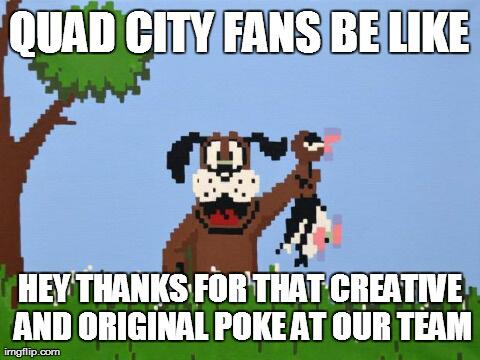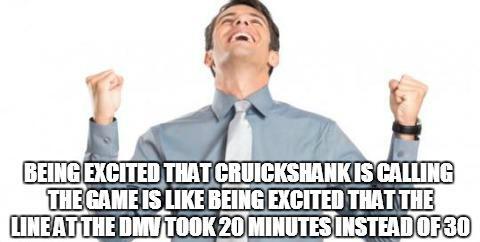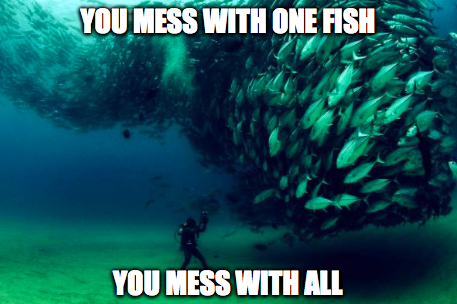- It is game day in Allen and if past is prologue you don't want to miss this game. In the five year history of the Allen Americans they have lost the opening game of a playoff series on six occasions and in five of those series they won game two. The one time they lost game two was against Odessa in 2011 when the Americans came back and won three straight games to win the five game series 3-2. So the point being is good things tend to happen after Allen loses the first game of a playoff series. Let's hope that is the case today.
- Keys to the game will be a good start, lots of energy, pucks and players to the net, don't take chances which lead to odd man rushes, play physical without taking penalties and capitalize on special teams. Easier said than done.
- Arizona beat Denver last night 4-3 to tie that series at one game a piece. The next two games will be played in Arizona on Tuesday and Wednesday as this series is a 2-2-1-1-1 unlike Allen vs Quad City which is 2-3-2. Not sure if it is the building/rink availability that decides this or some other factor but it is not distance as the distance between Denver and Arizona (Prescott Valley) is almost identical to the distance from Allen to Quad City. They are both about 12 hour trips.
- At playoff time it is always interesting to read inspiring playoff stories. I recently mentioned in the "Did You Know" section of the the blog the 1983-1984 Tulsa Oilers who had to overcome some real adversity when the team went broke during the season and they no longer had a home rink. Despite having to play all their games on the road during the playoffs they won the championship. Steve Martinson was a member of that team. I asked Steve what he remembers about the 83-84 Oilers and here are some of his memories:
- I remember we had a big party we called the "folding party" and the next day we were meeting to see where we would be reassigned as they were going to ship us all out to different places. There were only five teams in the league and I guess the CHL didn't want the league to go to just four teams so at the last minute they agreed to take us over rather than disperse the team.
- The CHL moved us all to Denver as it was more centrally located and we stayed at a Residence Inn. The first game we played against Denver, who wasn't happy the Oilers were living in their town, we had a bench clearing brawl. We played every playoff game on the road and only lost one game.
- That team had some great players on it. Both NHL veterans and those that would go on to NHL careers. Of the 31 guys that played at least one game with Tulsa that year 23 of them played some games in the NHL. We were affiliated with the New York Rangers and Herb Brooks was the Rangers coach that year. Olympians Bill Baker and Rob McClanahan were on that team. Others included current Washington Capitals general manager George McPhee, former NHL player and head coach Robbie Ftorek, Dave Barr who played with many NHL teams including the Dallas Stars, Grant Ledyard who had a long NHL career and also played several years for Dallas, and goalie John Vanbiesbrouck who had a twenty year career in the NHL.
- Tulsa had a nice rink downtown but they wanted too much for the lease so the owners decided to play at an old rink at the fairgrounds. I remember coming to that rink the first week and the ice plant wasn't working. It was a horrible place to play and also to watch a game. There were a few times we had to go to Oklahoma City to practice.
Here is a story written 2008 by Corey Erdman that was published in "The Hockey News" about the 1983-1984 Tulsa Oilers. The title of the article is, "The Tulsa Oilers Were True Road Warriors."
In 2008, the sports world marveled at the New York Giants, winning 11
consecutive road games, coining them the 'ultimate underdog.' But what if they didn't have a home stadium at all? Or a $110 million
payroll? And what if Tom Coughlin’s office was in the laundry room
beneath the bleachers?
Such was the fate of the Tulsa Oilers during the 1983-1984 season. Despite a rabid fan following, Oilers ownership was unable to sustain
the team. By February 1984, the ownership group had disintegrated,
leaving the team in the hands of the Central League. The Oilers were
bankrupt, which also voided the lease on their home rink, the Tulsa
County Fairgrounds Pavilion. "I don't know if (ownership) just left town, or what," said former NHLer
John Vanbiesbrouck, the Tulsa netminder in 1983-84. "As a young player,
you're not really aware of ownership issues. All I knew was that if the
team folded, we all had to go somewhere. The Rangers asked all of us
where we wanted to go, and of course we all answered 'New York.' But,
they suggested I go back to my junior team, instead."
One of the calming influences on the Tulsa roster was defenseman Bill
Baker, a member of the Miracle on Ice 1980 U.S. Olympic team. Baker was
winding down his career, planning on returning to the University of
Minnesota for a degree in dentistry - one he eventually earned. "That's the kind of strange, typical thing you encounter when you're in
the minor leagues," Baker said. "I was never one to panic – I was never
flashy, either. I always liked to lead by example. I guess in the
(dressing) room I'd be vocal, trying to be a positive influence on the
younger players."
A meeting was set for February 14th, which included commissioner Bud
Poile and current Maple Leafs GM Cliff Fletcher. A dispersal draft was
discussed, but Tulsa coach Tom Webster and New York GM Craig Patrick
negotiated an agreement calling for the CHL and the Rangers to split the
cost of keeping the team alive. Oilers players moved into a Residence
Inn in Denver and the team began to practice at the University of
Denver. “(Ownership) was at one point arguing over a hundred dollars – whether
to stop in three cities, or for an extra hundred dollars, to fly
direct,” recalled Webster of the crisis. “But the situation ended up
being better for us in Denver, because we all had to stay together.
Every other night one of the wives would cook dinner, and so a lot of
the single guys actually got some good grub in them.”
The Oilers – who began to be known as the CHL Oilers – fed off Webster
and veterans such as Robbie Ftorek, who would become captain of the
Quebec Nordiques and eventually an NHL coach. “I learned not to kick a water bottle next to a bench support, because
he (Webster) almost broke his foot,” joked Ftorek, when asked what he’d
learned from Webster. “He stayed focused on demanding good play, and if
you believe in what you’ve got in front of you, you can do wonders.” Added Baker: “Tom had such an air of maturity about him, always keeping things together instead of letting them fall apart.”
But not everyone’s reaction was positive. While the accommodations at
the Residence Inn were top-notch, the facilities at the University of
Denver were not. Webster's 'office' was in the laundry room beneath the
bleachers. The shower in the Oilers dressing room was little more than a
glorified garden hose. And the rink’s Zamboni was numbered 003, leaving
Webster to believe that it was “the third one ever made.” To top it all off, Colorado Flames fans were none too happy with the vagabond Oilers invading their territory. When ice time wasn’t available at the university, the Oilers practiced
at a rink in a local shopping mall. Mall rules prohibited the use of
pucks, so Coach Webster would use Nerf balls. “Webster really went the
extra mile with myself and Ron Scott (the Oilers’ backup),”
Vanbiesbrouck said. “He knew we were two young goalies that needed a lot
of work, by whatever means necessary – he’d use tennis racquets or
shoot tennis balls in the parking lot.”
The Oilers finished their season with a six-week road trip. In true
storybook style, they won nearly every one of those games by the skin of
their teeth, finishing the season dead-last in goals-for, but first in
goals-against. Vanbiesbrouck took home the league’s Most Valuable Player
award, as well as the Terry Sawchuck award for top goaltender. Dave Barr and George McPhee provided most of the offense, while Bill
Baker’s no-nonsense style rubbed off on young roommate Grant Ledyard,
who was out to prove a point to himself and the Rangers during the
playoffs. “I kind of had to make a leap,” Ledyard said, “I had never thought of hockey as a way to make a living before.”
The Oilers beat the Salt Lake Eagles in a five-game semi-final series,
riding the momentum of a Cam Connor fight with Eagles hot prospect
Gerald Diduck. “Boy, did (Connor) ever do a number on him,” recalled Baker.
The Oilers then played the Indianapolis Checkers in what turned out to
be a short, unceremonious end to the season – a victorious four game
sweep with all four games in Indianapolis, of course. Ledyard was named
series MVP, launching a career that would see him play more than 1,000
NHL games.
“I remember being stunned that I was even considered for MVP,” Ledyard
said. “But they brought out this trophy and this thing was as tall as I
was. It was the biggest trophy I’ve ever seen, and I haven’t seen it
since. I know I didn’t carry it out of there, because I couldn’t – it
took two people to carry the darn thing!” And then it was over. “Can you imagine that? We won a championship in a practice facility in
Indianapolis, in front of maybe 500 people,” Webster said. “It was a magical season. We set out to prove that you didn’t need a home rink to win a championship, and we did it.”
 |
| Courtesy CHL Memes |
DID YOU KNOW: In addition to all of the great players he played with in his 50 games in the NHL Steve Martinson played with some future NHL coaches when playing in the minors. Steve Martinson played with the following NHL head coaches:
Lindy Ruff (Buffalo & Dallas) - 1992-1993 San Diego Gulls
Claude Noel (Columbus &Winnipeg) - 1984-1985 Toledo Goaldiggers
Craig Berube (Phildelphia Flyers) - 1986-1987 Hershey Bears
Dave Tippett (Dallas & Phoenix ) - 1994-1995 Houston Aeros
Robbie Ftorek (Los Angles, New Jersey, Boston) - 1983-1984 Tulsa Oilers



















